Accelerate > Publications
Search this online library featuring the latest FAO publications, issue papers and briefs which offer up-to-date knowledge and innovative insights for SDG acceleration.
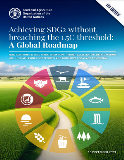
Achieving SDG2 without breaching the 1.5C threshold: A Global Roadmap
2023
Accelerated climate actions can transform agrifood systems and help achieve food security and nutrition both today and tomorrow.
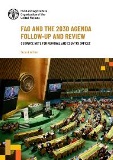
FAO and the 2030 Agenda Follow-up and Review: Guidance Note for Regional and Country Offices
2023
The Guidance Note describes the process of the preparation of the VNRs and what FAO Regional and Country Offices need to be aware and mindful of when providing support to the national partners. It covers information about the importance of the follow-up and review process for the 2030 Agenda and the SDGs, including information about the gaps in the coverage of the Voluntary National Reviews, and recommendations on strengthening VNRs to be meaningful instruments for the acceleration of the SDGs.
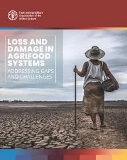
Loss and damage and agrifood systems - Addressing gaps and challenges
2023
The purpose of this report is to stimulate discussions on the central role of agrifood systems in the loss and damage debate and identify the gaps in data, knowledge and finance that need to be addressed. The report provides an overview of the loss and damage concept, the status of analytical methodologies and tools, a summary of the reporting on loss and damage in nationally determined contributions (NDCs), an outline of the policy needs and some preliminary analysis of the financing needs.
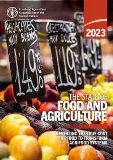
The State of Food and Agriculture 2023 - Revealing the true cost of food to transform agrifood systems
2023
The State of Food and Agriculture 2023 looks into the true cost of food for sustainable agrifood systems. The report introduces the concept of hidden environmental, health and social costs and benefits of agrifood systems and proposes an approach – true cost accounting (TCA) – to assess them.
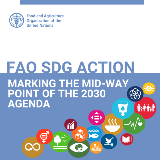
FAO SDG Action: Marking the mid-way point of the 2030 Agenda
2023
As we stand at the midpoint of the 2030 Agenda, it is both a moment of reflection and an opportunity to renew our commitment to achieving the SDGs. In August 2023, the FAO Office of SDGs launched a survey, receiving over 600 responses that shared valuable insights, experiences and actions taken by FAO offices towards the achievement of the SDGs. In addition this survey, FAO project data was leveraged to present this visual representation of FAO’s contribution to the 2030 Agenda implementation.
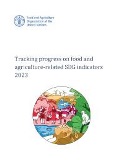
Tracking progress on food and agriculture-related SDG indicators 2023
2023
At the mid-point of the Agenda 2030 for Sustainable Development, there is an urgent need to understand where the world stands in eliminating hunger and food insecurity, as well as in ensuring sustainable agriculture. The new report of the Food and Agriculture Organization of the United Nations (FAO),offers analysis and trends on indicators across eight Sustainable Development Goals (SDGs) – in particular, SDGs 1, 2, 5, 6, 10, 12, 14 and 15.

The State of Food Security and Nutrition in the World 2023 - Urbanization, agrifood systems transformation and healthy diets across the rural–urban continuum
2023
This report provides an update on global progress towards the targets of ending hunger (SDG Target 2.1) and all forms of malnutrition (SDG Target 2.2) and estimates on the number of people who are unable to afford a healthy diet. Since its 2017 edition, this report has repeatedly highlighted that the intensification and interaction of conflict, climate extremes and economic slowdowns and downturns,...
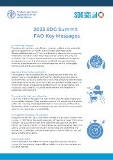
2023 SDG Summit: FAO Key Messages
2023
The 2023 SDG Summit will serve as a pivotal event towards achieving the SDGs, as gathered Heads of State and Government are to carry out a comprehensive review of progress, respond to the impact of multiple crises, and provide high-level political guidance on transformative and accelerated actions for achieving the 2030 Agenda. FAO has developed these key messages to inform the discussions in the lead up to and during this Summit and the Political Declaration which will result from them.
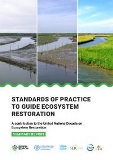
Standards of practice to guide ecosystem restoration: A contribution to the United Nations Decade on Ecosystem Restoration
2023
The United Nations Decade on Ecosystem Restoration 2021–2030 (hereafter “UN Decade”) recognizes the critical need to prevent, halt and reverse the degradation of the world’s ecosystems. Effective restoration of degraded ecosystems is of paramount importance for recovering biodiversity, ecosystem health and integrity, ecosystem goods and services, climate-change mitigation and human health and well-being.
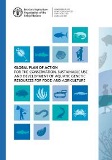
Global Plan of Action for the Conservation, Sustainable Use and Development of Aquatic Genetic Resources for Food and Agriculture
2022
This Global Plan of Action for the Conservation, Sustainable Use and Development of Aquatic Genetic Resources for Food and Agriculture (GPA) was developed by FAO at the request of the members of the Commission on Genetic Resources for Food and Agriculture in response to the needs and challenges identified in the first global assessment of the status of Aquatic Genetic Resources for Food and Agriculture (AqGR).
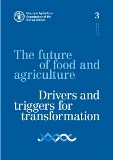
The future of food and agriculture – Drivers and triggers for transformation
2022
This report aims at inspiring strategic thinking and actions to transform agrifood systems towards a sustainable, resilient and inclusive future, by building on both previous reports in the same series as well as on a comprehensive corporate strategic foresight exercise that also nurtured FAO Strategic Framework 2022–31. It analyses major drivers of agrifood systems and explores how their trends could determine alternative futures of agrifood, socioeconomic and environmental systems.
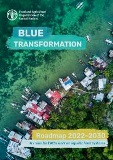
A vision for FAO’s work on aquatic food systems
2022
This document outlines a roadmap for the transformation of aquatic food systems - ‘Blue Transformation’, providing a compass for the FAO’s work on aquatic food systems for the period 2022–2030. This roadmap for Blue Transformation aligns with the 2021 Declaration for Sustainable Fisheries and Aquaculture of the Committee on Fisheries (COFI) of the Food and Agriculture Organization of the United Nations (FAO) and FAO’s Strategic Framework 2022–2031...
Tracking progress on food and agriculture-related SDG indicators 2022
2022
Seven years into the 2030 Agenda, there is an urgent need to understand where the world stands in eliminating hunger and food insecurity, as well as in ensuring sustainable agriculture. FAO’s new report, “Tracking progress on food and agriculture-related SDG indicators”, offers analysis and trends on indicators across eight SDGs (1, 2, 5, 6, 10, 12, 14 and 15), highlighting areas of progress and areas where further effort is needed.
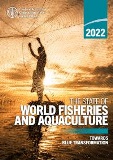
The State of World Fisheries and Aquaculture 2022 - Towards Blue Transformation
2022
The 2022 edition of The State of World Fisheries and Aquaculture coincides with the launch of the Decade of Action to deliver the Global Goals, the United Nations Decade of Ocean Science for Sustainable Development and the United Nations Decade on Ecosystem Restoration.
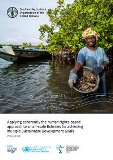
Applying coherently the human rights framework to small-scale fisheries for achieving multiple Sustainable Development Goals
2022
In the context of the International Year of Artisanal Fisheries and Aquaculture 2022, FAO, the Office of the High Commissioner for Human Rights (OHCHR) and the collaborative research initiative One Ocean Hub have been collaborating to raise awareness of the full scope of the human rights framework applicable to small-scale fisheries. This policy brief aims to clarify the scope of the international human rights framework, including the corresponding State obligations...
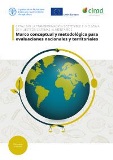
Catalysing the sustainable and inclusive transformation of food systems
2022
Food systems are intimately linked to our lives – through the food we eat, our nutrition and health, our livelihoods, jobs, and the environment and natural resources of the planet. The main challenge for food systems is to produce nutritious food for all while preserving our biodiversity and environment and ensuring equitable distribution of wealth. This brief provides a summarized version of the methodology used to conduct a global assessment of food systems in over 50 countries ...
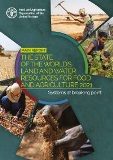
The State of the World’s Land and Water Resources for Food and Agriculture 2021 – Systems at breaking point
2021
Satisfying the changing food habits and increased demand for food intensifies pressure on the world’s water, land and soil resources. However, agriculture bears great promise to alleviate these pressures and provide multiple opportunities to contribute to global goals. Sustainable agricultural practices lead to water saving, soil conservation, sustainable land management, conservation of natural resources, ecosystem and climate change benefits....
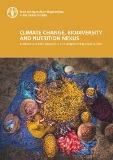
Climate change, biodiversity and nutrition nexus
2021
This paper identifies entry points within agri-food systems to improve biodiversity and diets, two levers that can be used to enhance nutrition and optimize environmental sustainability while ensuring social equity, especially of the most vulnerable people. It also presents recommendations for concrete actions by key stakeholders – governments, academia, civil society, private sector, and development partners –to build resilient, inclusive, and sustainable agri-food systems. KEYWORDS:
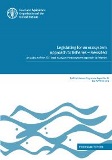
Legislating for an ecosystem approach to fisheries – Revisited
2021
The ecosystem approach to fisheries (EAF) is a risk-based management process for the planning, management, development, regulation and monitoring of fishing and fishing-related activities. EAF addresses ecological consequences of fishing as well as social, economic and institutional aspects of fisheries sustainability. Adequate legislation and regulatory frameworks are key to successful implementation of the EAF.
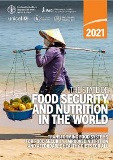
The State of Food Security and Nutrition in the World 2021 - Transforming food systems for food security, improved nutrition and affordable healthy diets for all
2021
In recent years, several major drivers have put the world off track to ending world hunger and malnutrition in all its forms by 2030. The challenges have grown with the COVID-19 pandemic and related containment measures. This report presents the first global assessment of food insecurity and malnutrition for 2020 and offers some indication of what hunger might look like by 2030 in a scenario further complicated by the enduring effects of the COVID-19 pandemic.
Browse by SDG
- SDG1: No Poverty
- SDG2: Zero Hunger
- SDG3: Good Health & Well-being
- SDG4: Quality Education
- SDG5: Gender Equality
- SDG6: Clean Water & Sanitation
- SDG7: Affordable and Clean Energy
- SDG8: Decent Work and Economic Growth
- SDG9: Industry, Innovation and Infrastructure
- SDG10: Reduced Inequalities
- SDG11: Sustainable Cities and Communities
- SDG12: Responsible Consumption and Production
- SDG13: Climate Action
- SDG14: Life Below Water
- SDG15: Life on Land
- SDG16: Peace, Justice and Strong Institutions
- SDG17: Partnerships for the Goals
Browse by Better
Browse by Priority Area
- Innovation for Sustainable Agriculture Production
- Blue Transformation
- One Health
- Small-Scale Producers' Equitable Access to Resources
- Digital Agriculture
- Healthy Diets for All
- Nutrition for the Most Vulnerable
- Safe Food for Everyone
- Reducing Food Loss and Waste
- Transparent Markets and Trade
- Climate Change Mitigating and Adapted Agrifood Systems
- Bioeconomy for Sustainable Food and Agriculture
- Biodiversity and Ecosystem Services for Food and Agriculture
- Achieving Sustainable Urban Food Systems
- Gender Equality and Rural Women's Empowerment
- Inclusive Rural Transformation
- Agriculture and Food Emergencies
- Resilient Agrifood Systems
- Hand-in-Hand Initiative
- Scaling up Investment
